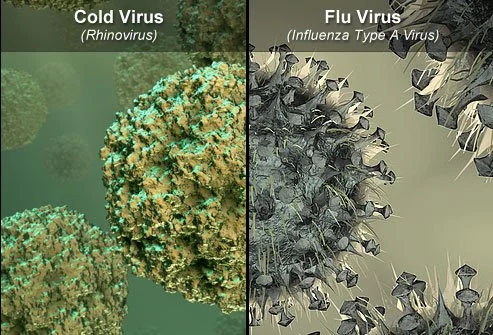The difference between cold and flu.
When sniffles strike, is it just a cold or something more serious like the flu? Understanding the difference can help you navigate treatment options effectively. Colds usually start slowly with a runny nose and mild fatigue, while the flu hits hard and fast, bringing high fever, body aches, and intense fatigue. Knowing these distinctions can guide your response. For a cold, rest and fluids may suffice, but the flu may require antiviral medication and medical attention.
① Different types of viruses
The cold and flu are both caused by different types of viruses that infect the respiratory tract. The cold is usually caused by rhinoviruses, parainfluenza, or seasonal coronaviruses, while the flu is caused by influenza viruses. The viruses are spread through respiratory droplets from coughing, sneezing, or talking, or by touching contaminated surfaces
② Different incubation periods
The cold and flu have different incubation periods, which is the time between exposure to the virus and the onset of symptoms. The cold has a shorter incubation period of 1 to 3 days, while the flu has a longer incubation period of 2 to 4 days. This means that you may start feeling sick sooner with a cold than with a flu.
③ Different durations
The cold and flu have different durations, which is the time that the symptoms last. The cold has a shorter duration of 7 to 10 days, while the flu has a longer duration of 10 to 14 days. This means that you may recover faster from a cold than from a flu. However, some people may have lingering symptoms or complications from either condition
④ Different treatments
The cold and flu have different treatments, which depend on the severity and type of symptoms. The cold can be treated with over-the-counter medicines, such as decongestants, antihistamines, or pain relievers, to ease the symptoms. The flu can be treated with prescription antiviral drugs, such as oseltamivir, zanamivir, or baloxavir, to reduce the severity and duration of the symptoms. However, these drugs are most effective if taken within 48 hours of the onset of symptoms. Both conditions can also be treated with home remedies, such as drinking fluids, gargling salt water, or using a humidifier or vaporiser.
⑤ Different prevention methods
The cold and flu have different prevention methods, which include personal and public health measures. The cold can be prevented by practicing good hygiene, such as washing your hands, covering your mouth, and avoiding contact with sick people. The flu can be prevented by getting a yearly flu vaccine, which protects against the most common strains of the influenza virus. Both conditions can also be prevented by boosting your immune system, such as eating well, exercising, sleeping, and managing stress.
The difference between cold and flu symptoms
Cold Symptoms:
Gradual Onset: Cold symptoms typically develop gradually over a few days.
Nasal Congestion: Stuffy or runny nose is a common cold symptom.
Sore Throat: Mild to moderate sore throat may accompany a cold.
Sneezing: Frequent sneezing is common with a cold.
Cough: A mild cough may develop, often producing clear mucus.
Mild Fatigue: Fatigue may be present but is usually mild.
No Fever or Low-grade Fever: Fever, if present, is typically low-grade.
Flu Symptoms:
Sudden Onset: Flu symptoms usually come on abruptly.
High Fever: Fever is typically higher with the flu, often exceeding 38°C (100.4°F).
Body Aches: Severe body aches and muscle soreness are common flu symptoms.
Fatigue: Profound fatigue and weakness are hallmark signs of the flu.
Dry Cough: Coughing is common with the flu, often producing little or no mucus.
Headache: Intense headaches are frequently reported with the flu.
Chills and Sweats: Chills followed by sweating are common flu symptoms.
Nasal Congestion: Nasal congestion may occur but is less common than with a cold.
What Should I do if I have any of the above symptoms?
Combat colds and flu with confidence by following these simple steps. For mild symptoms, try over-the-counter remedies, ample fluids, and rest. However, if flu symptoms persist, don't hesitate to consult a 24DOC GP for expert advice and potential antiviral treatment.
Remember, if you experience severe or persistent symptoms like chest pain, breathing difficulties, or coughing up blood, seek medical attention promptly.
Prevention is key! Practice good hygiene, avoid close contact with sick individuals, and bolster your immune system. Don't forget, the best defense against the flu is an annual flu vaccine, offering protection against prevalent strains.







